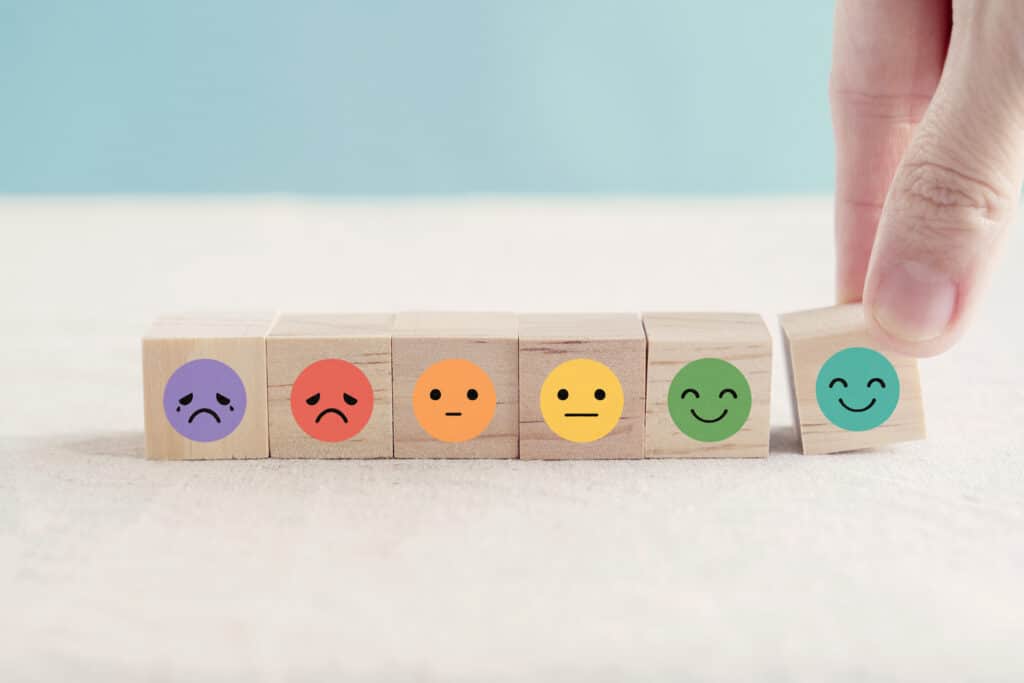Psychological Effects of Stress
How do you manage stress?
If you’ve experienced stress in your life (which nearly everyone has), you know how uncomfortable it can be. From job stress to relationships and big life events, stress can pop up anywhere and the physical and emotional symptoms can be crippling if not properly treated.
In terms of physical health, too much stress can affect appetite, the immune system, energy, focus, cause muscle tension, and more. The sympathetic nervous system controls many vital functions within the human body and is directly related to the stress response of the body and mind.
If managing stress is challenging for you, it can be helpful to understand the psychological effects of stress and how these stress responses can affect your daily life.
What is stress?
Stress is a normal human reaction to particular situations, people, tasks, and challenges in our daily lives. When we experience something difficult or challenging, our bodies produce physical and mental responses, known as stress.
Stress can create positive physical responses in small doses and in healthy situations, like maintaining your focus for longer or keeping your brain and body awake longer to prepare for a test, a work project, or something important. This is known as short-term stress because it dissipates once the test is over, the presentation is done, or the big life event passes.
Long-term stress, known as chronic stress or burnout, can be physically and emotionally damaging and dangerous. Understanding the effects and impact that stress can have on the body and mind is essential for managing stress and deciding to seek treatment.
What are the psychological effects related to stress?
Stress becomes unhealthy when you never get any relief from it, leading you to feel stressed out all the time — chronic stress can be physically and mentally dangerous. Many individuals try to manage chronic stress on their own before seeking support from a mental health professional.
The body’s response to stress is triggered by the central nervous system, which controls heart rate, blood pressure, respiration, digestion, and more. With these vital functions of the human body affected by stress, you can see how the presence of stress hormones affects us physically just as much as they do mentally.
Here are some physical symptoms related to stress that should be monitored:
Physical Symptoms of Stress
- Elevated heart rate
- High blood pressure
- Fatigue and sleep problems
- Chest pain
- Headaches, dizziness
- Muscle tension
- Digestive problems
- Weakened immune system
These symptoms are a side effect of a surge of adrenaline and cortisol, the stress hormones in the human body during stressful fight or flight response situations. Cortisol can suppress digestion, alter immune system responses, and communicates with the brain to control our mood and motivation.
The body’s ability to respond to stress symptoms to protect itself is pretty amazing. However, there are other symptoms of stress that can cause alarm, particularly those stress symptoms that can cause other health problems.
These are the mental or psychological symptoms of stress:
Psychological Symptoms of Stress
The psychological stress responses made by the body can result in mental health conditions if not properly addressed and treated.
1. Anxiety
Defined by persistent worry, anxiety is often identified as a stress response. The main difference between stress and anxiety is that stress is caused by a significant task, person, or situation that is typically alleviated once handled.
Anxiety, on the other hand, does not dissipate in the absence of a stressor.
31% of Americans will experience an anxiety disorder in their lifetime, according to the National Institute of Mental Health.
Anxiety can’t always be associated with one event or person; instead, those experiencing an anxiety disorder may jump from various events and situations, feeling equally anxious, worried, or depressed about all of them.
Anxiety can lead to insomnia, muscle tension, lack of focus, fatigue, and more. Learning stress management techniques can help alleviate or reduce anxiety symptoms for many individuals who suffer from anxiety as well.
2. Depression
Chronic stress can lead to overtaxed psychological responses, which can impair much of our mental health.
Stress and depression are often linked because of their similar characteristics and side effects. Stress can disrupt a person’s healthy habits and coping methods, leading to more physiological responses.
For example, say you end a long-term relationship and are feeling depressed and exhausted about starting over. You begin canceling social plans, avoiding phone calls with family and friends, or skipping your workout classes due to fatigue and lack of motivation. Without these healthy coping methods in your daily life, further mood problems may arise, like depression.
Unhealthy coping mechanisms can directly impact your mood, creating a chain reaction of more unhealthy coping methods to a continuously lower mood; developing depression is one of the scenarios.
3. Panic attacks
Experiencing episodes of intense fear or terror are known as panic attacks and can be directly linked to the body’s response to stress.
Panic attacks can be triggered by stress and typically have intense physical side effects, including increased heart rate, sweatiness, trembling, and shaking, among many others.
While panic attacks are the body’s physical response, it’s important to know that panic disorder is a combination of the body’s response to psychological and physical effects.
Psychological Stress Signs
Stressors are the particular triggers or things that cause you stress. This can be a situation, individual, life event, or many other factors that affect your wellbeing. Stress itself is the response to the stressor, both the emotional and physical reactions.
There are common signs or situations that may become stressors in your life that you can watch out for. These include:
- Conflicts at home or relationship problems
- Workplace burnout caused by fear of job loss, new tasks, or demands
- Illness and fear of illness or injury in yourself or a loved one
- Bereavement or loss of a loved one
- Financial problems
- Experiencing abuse
- Moving homes or switching jobs
- Experiencing a traumatic event (car accident, death, crime)
These are just a few of the causes of psychological stress; most stressful life events trigger some kind of emotional and physical response.
Managing & Reducing Chronic Stress
Daily strategies to manage stress can be extremely helpful for those who suffer from chronic stress. Here are a few you can implement into your daily life for stress management.
- Get regular exercise
- Eat healthy, nutritious foods
- Practice meditation, breathing exercises, and relaxation techniques
- Get plenty of sleep every night
- Prioritize self-care
- Set realistic goals
- Lean on your community for support
- Practice letting go of things you can’t control
- Set boundaries when you need them
- Practice mindfulness and gratitude
- Develop time management skills
- Make time for leisure activities and hobbies
Living with and managing stress related disorders can be challenging, particularly when you face stressful situations on a regular basis. Knowing your triggers and taking steps to handle stress can drastically improve your quality of life.
Managing stress is a part of life, but it shouldn’t be done alone. Lean on your community of family and friends to help you through stressful times; whether this is your therapist, partner, or group of friends, having a reliable support system is essential to managing stress.
Manage Stress with Clear Telehealth
If long-term stress is overwhelming in your life or for a loved one, it may be time to seek the help and support of a mental health care professional.
At Clear Telehealth, our expert clinical care team is here to help you achieve sustainable mental health well-being and quality of life. Our virtual stress and burnout treatment program is designed to improve self-awareness, and help identify triggers are underlying factors that contribute to feelings of stress and anxiety, and depression. For working professionals, we accommodate stress leave requests so that you can focus your energy on treatment so that you can return to work with a new sense of vitality.
Contact us today 866.680.0969 to learn more and to see if you are eligible for a stress leave.





